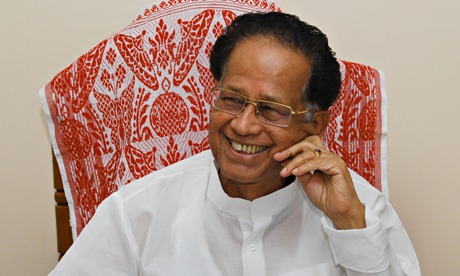Assam's chief minister argues that time change will save energy and synchronise the eastern state with the rest of the country.
By Julien Bouissou
The chief minister of Assam, Tarun Gogoi. Photograph: Biju Boro/AFP
Technically speaking, it would make sense to create a second time zone. There are almost 28 degrees of longitude between the country's eastern and western extremities, whereas on average a time zone corresponds to 15 degrees. In 2006 India's planning commission recommended two time zones, explaining that it would provide for substantial energy savings. At peak hours electricity demand currently exceeds supply by 17%.
But on two occasions, in 2002 and 2006, the federal government rejected proposals along these lines, for fear of chaos at the time border and rail accidents. The topic is politically sensitive in a country prone to separatist tension. Delhi is afraid a second time zone may distance north-eastern states. Indeed, it was on the grounds of national unity that India decided, shortly after independence, to abolish Mumbai and Kolkata time.
Two researchers at the National Institute of Advanced Studies in Bangalore, Dilip Ahuja and Debi Prasad Sengupta, advocate putting clocks back by half an hour all over India to satisfy the demands of north-eastern states and avoid chaos. In a study carried out in 2012 they calculated that with this arrangement India would save from 0.2% to 0.7% in energy, depending on the state.
Daylight has other virtues too. Drawing on research done in Britain suggesting that crimes and accidents happen more at night, the two scientists emphasised the advantages of stopping work an hour earlier.
But as the regional daily Assam Tribune pointed out this month, "a gain of half an hour for the eastern region may lead to loss of equal numbers of hours in the central and western regions".
India's Ministry of New and Renewable Energy says it will examine Gogoi's ideas. But with only four months before a general election, it seems unlikely the government will risk upsetting voters giving Assam more sunlight.
This article appeared in Guardian Weekly, which incorporates material from Le Monde







8 comments:
Thanks for the English version! To be honest, I appreciate your sincere support and greatest assistance you provide us with on a regular basis!
If studies were conducted and the results showed that it would be beneficial, I think you can try to translate it into reality.
I think that such a decision was made, since many analyzes and investigations were carried out before it was adopted.
It is necessary to understand how profitable it can be to analyze the data received and then only decide whether to make such an innovation or not.
The free robux is generated by the use of robux generator for the free roblox free robux game available on the site http://onlinefreerobux.com/ for free.
If you are a student you for sure know how it's difficult to make a perfect paper. I'm a writer and do it every day. I like my job but sometimes I feel a lack of skills and my brain has no idea. It happens not so often. By the way, if you also need help with ideas you can check https://dissertationmasters.com/buy-a-persuasive-essay-online.html. This site is full of fresh ideas.
Hey there! If you see that writing papers is not easy task for you then it's better to apply to the writing service. There you can find cheap papers to buy and a lot of other things.
Assam is one of the biggest states of northeastern India and its population is in millions many students also looking for the best essay writing service to write an essay on the population of Assam. and now anybody also can takes this type of services online.
Post a Comment